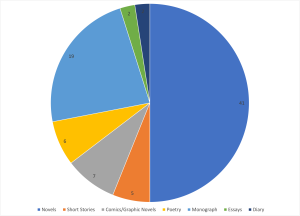I imagine everyone has had a morning or a day “get away” from them; looked up at the clock to realize that much more time has passed than they thought, with little if anything to show for it.
Is is possible to have an entire year get away from you? Because that’s how I feel about 2014. This blog was updated only sporadically through the year, and pretty much all of my other projects languished as well. And it’s not just that I was worse at writing things up; I actually read less, watched less, listened to less. At least, that’s how I feel; maybe that’s an artifact of not having a record to look back at. Anyway, there are many reasons for this, none of which are interesting or, really, sufficient: a busy teaching schedule, technology issues, moving from the apartment we’d lived in for over a decade, etc. Honestly, though, I don’t really know what happened; I just looked up at the clock and saw that it was 2015, and had to ask myself what I’d been doing with my time.
Since I can’t explain it, I can’t really be sure it won’t happen again, but I’m also sure that part of the answer is that I got out of several good habits over the course of the year; this blog is one of them. So, in the interest of getting back in the habit: some recommendations.
Unintentional conversation: “The Definition of a Dictionary” by Stefan Fatsis, and “The Future of the Web is 100 Years Old” by Alex Wright
The people at Merriam Webster are currently hard at work on a new edition of their unabridged dictionary, and this piece asks the sadly inevitable question: why bother? When there are any number of places to look up the definitions of words— sites that respond faster than Merriam, more immediately reflecting the appearance of new terms, and which don’t charge anything for access— why have dozens of people working thousands of hours to revise and create definitions for a new edition? Of course, Merriam is adapting to changing times as well, and the new unabridged edition won’t ever exist in physical form, so it’s not as though they are unaware that things have changed, and, moreover, they seem to have hit upon a business model that, for the meantime anyway, still makes money. But a big part of the answer seems to be that they believe that there is value in an authoritative source, a source that is, precisely, slower and more deliberate and, by implication if not intention, more prescriptive.
Which leads me to Wright’s article, in which he discusses a number of past efforts to find a way of cataloging and indexing a vast quantity of information— all of human knowledge, in fact. Framed as a kind of long-lens history of the world wide web, Wright really seems more interested in the conflict between top-down, centralized indexing schemes, in which some person or agency comes up with a system of categories and the decides where to place any given piece of information within that system, and so called “flat” systems like the web (at least in its initial iteration), in which the users of the data organize it by creating links between different pieces, developing chains of association that allow others to move through the data, following previous users’ paths or creating new ones that they find more useful. The notion of the “Semantic Web,” in which pages will be indexed using metadata made up of categories created by some kind of governing body or agency, is controversial in part because it undermines this “flatness” and moves the web more toward the more centralized kind of indexing scheme.
All this is, of course, part of a larger debate that we’ve been having for a while now about information “gatekeepers” whose utility— and, more importantly, social and cultural status— has been “disrupted” by the openness of the web and the power it gives anyone and everyone to generate and share information. My own sense is that authority is important, because it provides a necessary relief from some of the cognitive work of evaluating the credibility of various sources of information; clearly, though, when the “gatekeepers” are not simply once source among others but the means of access to all the sources (as Google is rapidly becoming), this presents other concerns.
Article: “Pulp’s Big Moment” by Louis Menand
Prior to about the 1930s, books were sold more or less only in dedicated book stores; they were mostly hardback, and relatively expensive., and as a result even well-received books generally only sold a few thousand copies. At about that time, in response, the cheap, “pocket-sized” paperback was conceived of— more or less simultaneously by the founders of Pocket Books in the U.S. and Penguin in the U.K— as a way of selling more books by putting them in more places. The format was cheap, but even more important was the fact that the books fit in racks that could go in the corner or a drug store or newsstand or train station. As a consequence, some authors began to sell hundreds of thousands or even millions of copies. There were all kinds of knock-on effects, like the proliferation of racy covers that made every book, even Catcher in the Rye and 1984, look dirty, leading to hearings in Congress. Most importantly, though, the pulp paperback brought pleasure reading to the American public in general by marketing it, for better or for worse, as another form of entertainment in competition with movies and TV.
Article: “Wolflandia: The Fight Over the Most Polarizing Animal in the West” by Elliott D. Woods
I guess it’s no surprise that the groups mostly responsible for hunting wolves close to extinction in the American west— farmers and ranchers and the government officials who are responsible for dealing with their concerns— don’t like them any more now that they are making a comeback. Maybe it’s not even surprising that their sense of anger and frustration over the damage done to their livelihood by wolves— coupled with a fair dose of misinformation about the scale of the problem— has linked up with the broader anti-government sentiment that is pervasive in this part of the country. What is surprising is how Woods make me sympathize with these people and their situation, even as I remain convinced that they are ultimately wrong.
Song: “Begin Again” by Purity Ring
Purity Ring’s debut was my favorite album of 2013, and their new one will be released on March 2. From this it doesn’t sound like a huge departure for them, but I am alright with that.
Edit: Get all of the articles from this post as a Readlist here.


